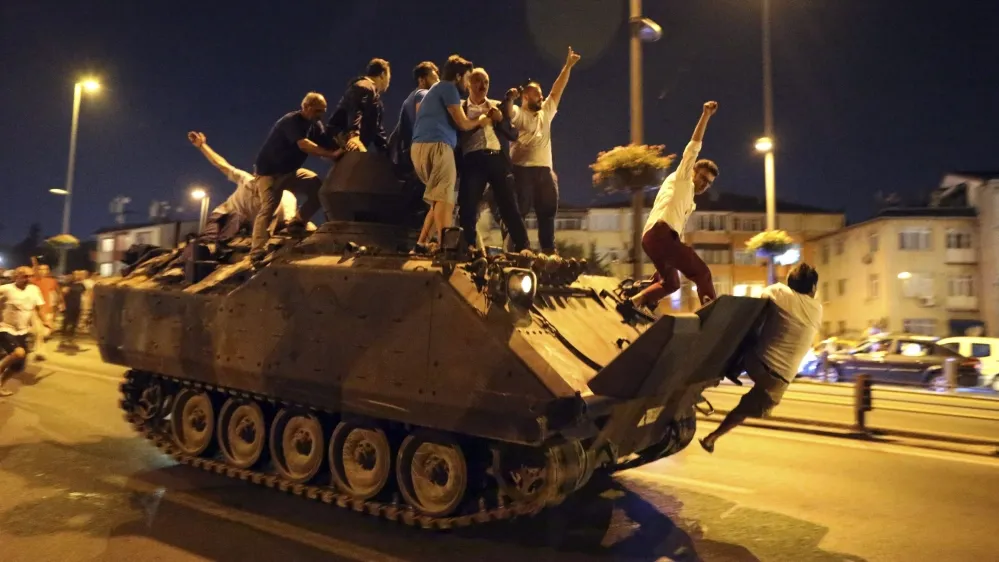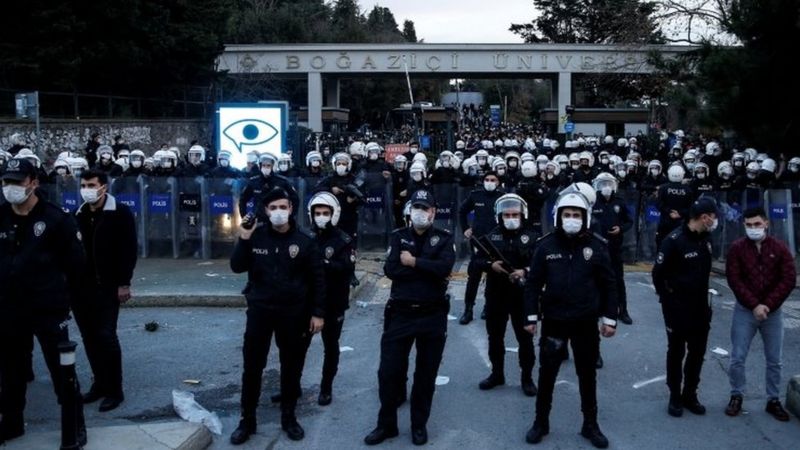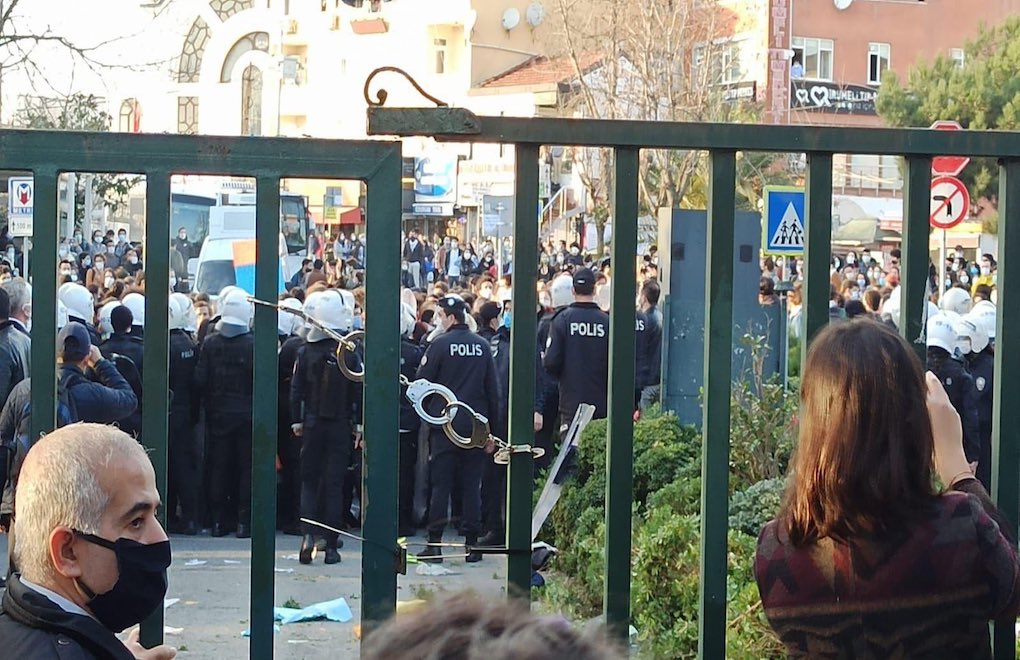Last week I started writing about the censorships that I can recall from the time that I lived in Turkey. I expected to be enough material for one blog post, yet in this depressing chronology, I am not even discussing the events that took place within the last five years. It is deeply saddening to focus on the demise of freedom of speech in the place I grew up in and how far away it is from being unrestricted.
The topic that I will start my post with is the 2016 coup d’etat attempt which was another traumatic event for everyone who lived through it. Turkey has a complicated history of involving the military in politics and suffered a lot of coups, coup attempts, and uprisings that came with public terror and periods of repression.
2016 Coup d’etat attempt and the Media Purge
On the 15th of July 2016, the Turkish Armed Forces tried to seize government institutions and overthrew the president. This attempt was faced with civil resistance that was encouraged by the president when he Facetimed a news reporter on air and addressed the nation to resist and defend democracy.
Civilians fought against the army with anything they could find and also allegedly the weaponry distributed by the Police forces. This has been reported to be the bloodiest coup d’etat attempt in the political history of Turkey.
Erdogan making a statement through Facetime. Says the military coup will be thwarted. Perpetrators will be punished. pic.twitter.com/d5dmVfMMV8
— Mahir Zeynalov (@MahirZeynalov) July 15, 2016

The government claimed this attempt was planned and funded by the Gulen movement which is an Islamist fraternal movement and used to support the ruling party and Erdogan. I am not going to get into details either about the movement or about its complicated history with Turkish politics and the ruling party.
A purge started against the responsible groups, institutions, and individuals who were tied to or reported to have relations with the Gulen movement. The purge included government officials, military and police officers, judges, teachers, and academics with the revocation of their diplomas and accusations of involvement with terrorist organizations (this purge also justified the arrests and removal of academics who signed the Academics for Peace petition which calls the Turkish government to end state violence against Kurdish minorities) and lastly media outlets.
The media purge included the closure of three news agencies, 16 TV channels, 23 radio channels, 45 papers, 15 magazines, and 29 publishing houses, and blocked access to more than 20 news websites. It also included the transfer of their assets to the state’s treasury. The decree signed by the president also stated that any cabinet member may order the closure of any media organization if he deems it a threat to national security.
In the report by OHCHR (Office of the United Nations High Commissioner for Human Rights), media freedom experts urged the government to reconsider its actions against media freedom and stated:
The attempted coup cannot justify such a broad attack against almost all voices, not just critical ones but analytic and journalistic
(Freedom of Expression, 2016)
Wikipedia Ban
Wikipedia was banned for 3 years in Turkey from April 2017 to January 2020. The reason given for the block was in the article state-sponsored terrorism (the April 2017 version) stated that Turkey was sponsoring ISIS and AL-Qaeda and this statement was ruled out to be misinformation in mass media by the court.
As a Wikipedia user, there were still ways to access it, through VPN or mirror websites. The above-mentioned article was never on any of the mirror websites. The ban was lifted after the constitutional court ruled it a violation of human rights back in December 2019.
A Single Case of Successful Counter-Censor
This part is from one of the more recent memories of mine. On the first day of 2021, Erdogan surprised Bogazici University with a government-appointed rector who was an ex-AKP politician and without necessary academic affiliations that would qualify him for this position. Bogazici University students started protesting and supporters of the students also started demonstrations against this decision.
The sharing of details or broadcasting of the protests was done on social media platforms, mostly Twitter and Twitch where the members of the film club provided live broadcasts. The reason for this was that no mass media outlet was willing to cover the story and if they were they were not allowed in the campus by the police barricade.


During the heat of the protests, the internal affairs minister, Soylu went on air and said that protesters were terrorists that are fighting against the government and that the police force was appropriate to the situation, the situation being a peaceful protest in a university campus and the police force being hospitalized students, plastic bullets shot directly at people. Soylu later shared a tweet that celebrated the detention of some students. The phrase he used caused outrage and the protesters reported it repeatedly. Soylu deemed Twitter as ‘not free’ and moved to Telegram.
Most Recent Legislations
Before the 2023 election, a controversial and highly restrictive law on “disinformation law” which aims to criminalize the spread of disinformation. Sharing posts and stories that are perceived as inaccurate, and disruptive to Turkey’s domestic and external security, public order, and health can be charged with up to five years in jail. if the social media platform refuses to share the information necessary to make the arrest, the government holds the power to block it. This law also forces social media platforms to tweak their algorithms in a way that the government pleases.
Any Hope Left?
As I said in the first part of this series, the answer is no. It only seems to get worse and more restrictive over the years. As Turkey approaches the bottom of the press freedom index (currently ranking 165 out of 180), no counter-actions are taken and anyone opposing or criticizing faces really harsh punishments. I wish it could get better, but I do not know if I will live to see it.



Thank you for this (dreadful) survey. If Turkey wants to be fully integrated into the European Union, I suppose that they’ll have to start behaving at some point. To answer your last question, yes, there is always hope (patience) by disseminating the information. As you have shown, the first thing a dictator will try to kill is freedom of the press and freedom to know.